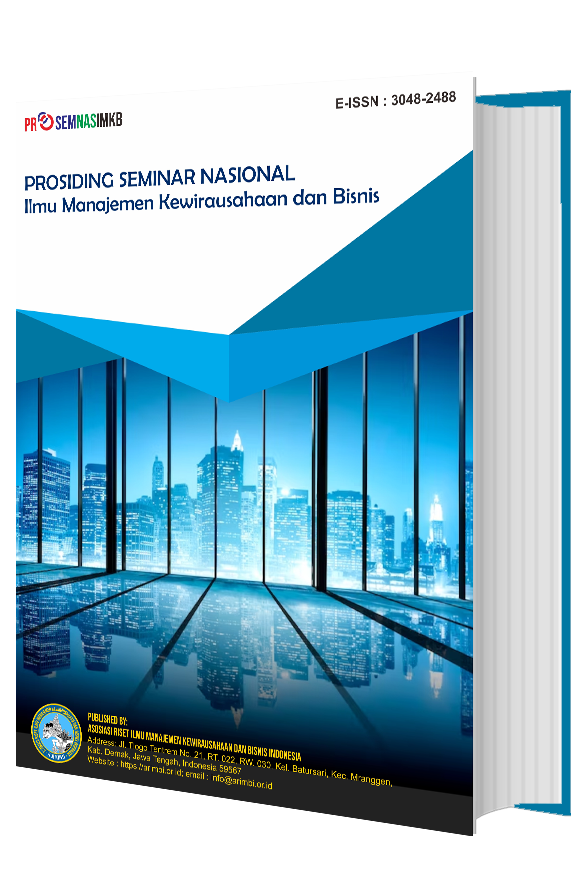Pengaruh Knowledge Sharing, Personal Knowledge, dan Job Prosedure terhadap Kinerja Pegawai di Sekolah Dasar
Studi pada Sekolah Dasar Negeri 1 Tanjungtirto
DOI:
https://doi.org/10.61132/prosemnasimkb.v2i2.184Keywords:
Employee, Job Prosedure, Knowledge Sharing, Performance, Personal KnowledgeAbstract
This study aims to determine the effect of knowledge sharing, personal knowledge, and work procedures on employee performance in Tanjungtirto 1 Public Elementary School. The background of this study is based on the importance of human resource quality in supporting organizational effectiveness, especially in elementary education institutions. The study population was all employees at Tanjungtirto 1 Public Elementary School with data collection using quantitative methods through questionnaires. The data obtained were then analyzed with the help of SPSS software through multiple linear regression tests to test the effect of independent variables on the dependent variable. The results showed that knowledge sharing did not have a significant effect on employee performance, as well as personal knowledge which also did not have a direct effect on performance. In contrast, work procedures were proven to have a positive and significant effect on improving employee performance. In addition, simultaneously knowledge sharing, personal knowledge, and work procedures together had a positive and significant effect on employee performance. This finding means that the existence of clear and structured work procedures has an important role in increasing work effectiveness, while knowledge sharing and personal knowledge require the support of a more focused management system to provide optimal contributions to employee performance in elementary school environments.
Downloads
References
Altarawbeh, R. M. (2023). The impact of knowledge management processes on sustainable performance: The mediating role of resource planning system. International Journal of Scientific and Management Research.
Budiyarti, N., Ilham, & Gustiasatlri, D. R. (2022). Pengaruh kompleksitas tugas dan knowledge sharing terhadap kinerja tugas guru. Jurnal Ilmiah, 5(2), 138–144.
Campbell, J. P., & Wiernik, B. M. (2015). The modeling and measurement of performance at work. Annual Review of Organizational Psychology and Organizational Behavior, 2, 47–74.
Clara, W. A., Entang, M., & Wulandari, D. (2024). Pengaruh efikasi diri, pemberdayaan, dan knowledge sharing terhadap keinovatifan. Jurnal Ilmiah, 12(1), 1–9.
Creswell, J. W. (2014). Research design: Qualitative, quantitative, and mixed method approaches (3rd ed.). SAGE Publications. http://apps.who.int/bookorders
Gómez-Mejía, L. R., Balkin, D. B., & Cardy, R. L. (2016). Managing human resources (8th ed.). Pearson Education Limited.
Iryani, Basalamah, I., & Amin, M. J. (2020). Implementasi knowledge management dan implikasinya terhadap kinerja pegawai. Jurnal Ilmiah, 306–316.
Iskandar, A., & Subekan, A. (2018). Pengaruh personal knowledge, job procedure dan technology terhadap kinerja pegawai organisasi publik. Jurnal Ilmiah, 9(2), 168–192.
Luhn, A. (2016). The learning organization. Central European Journal of Communication and Culture Studies, 1(1), 1–13. https://doi.org/10.1515/cks-2016-0005
Mangkunegara, A. A. A. P. (2017). Manajemen sumber daya manusia perusahaan. PT Remaja Rosdakarya.
Pamuji, R. S. S., F., L. K., & Dede, D. (2023). Pengaruh knowledge sharing terhadap performance dosen dengan kerja tim dan inovasi sebagai variabel intervening pada Universitas Majalengka. Jurnal Ilmiah, 4, 1–10.
Panahi, S., Watson, J., & Partridge, H. (2016). Conceptualizing social media support for tacit knowledge sharing: Physicians’ perspectives and experience. Journal of Knowledge Management, 20(2), 344–363. https://doi.org/10.1108/JKM-06-2015-0229
Rahmah, A. N., & Tania, K. D. (2023). Peran knowledge sharing dan motivasi kerja terhadap kinerja pegawai dengan kompetensi sebagai variabel intervening. Jurnal Ilmiah, 9(2), 478–496.
Rizal, S. (2025). Strategi peningkatan kinerja karyawan: Integrasi kaizen, personal knowledge, dan work life quality. Jurnal Ilmiah, 3(1), 14–29.
Robbins, S. P., & Coulter, M. (2016). Management (13th ed.). Pearson Education.
Robbins, S. P., & Judge, T. A. (2017). Organizational behavior (17th ed.). Pearson Education.
Setiadi, I. N., Mujahidin, M. A., Nisa, L. K., & Damayanti, I. (2021). Perilaku berbagi pengetahuan: Pemediasi dukungan pimpinan, pelatihan dan self efficacy terhadap kinerja guru. Jurnal Ilmiah, 1(1), 57–68.
Setiady, I. N., Rochman, T., & Edy, S. (2021). Pengaruh efikasi diri dan berbagi pengetahuan terhadap manajemen pembelajaran dan dampaknya pada kinerja. Jurnal Ilmiah, 8–16.
Sofyantoro, F., Lukiastuti, F., & Djou, L. D. G. (2025). Peran mediasi knowledge sharing: Perceived self-efficacy dan perceived environmental support terhadap kinerja karyawan BPJS Ketenagakerjaan cabang Cilacap. Al-Syir’ah, 15(1), 26–46. https://doi.org/10.37478/als.v15i01.5147
Tung, K. Y. (2018). Memahami knowledge management. Indeks.
Witari, K., Made, N., & Ayuni, S. (2023). Pengaruh pengetahuan pribadi, pelatihan, dan beban kerja terhadap kinerja pegawai pada Dinas Sosial Kabupaten Buleleng. Jurnal Jnana Satya Dharma, 11(2), 21–30.
Zahedi, M. R. (2024). Nonaka-Takeuchi knowledge management model based on institutional and infrastructure factors. VINE Journal of Information and Knowledge Management Systems. https://doi.org/10.1108/vjikms-02-2023-0033
Downloads
Published
How to Cite
Issue
Section
License
Copyright (c) 2025 Prosiding Seminar Nasional Ilmu Manajemen Kewirausahaan dan Bisnis

This work is licensed under a Creative Commons Attribution-ShareAlike 4.0 International License.






